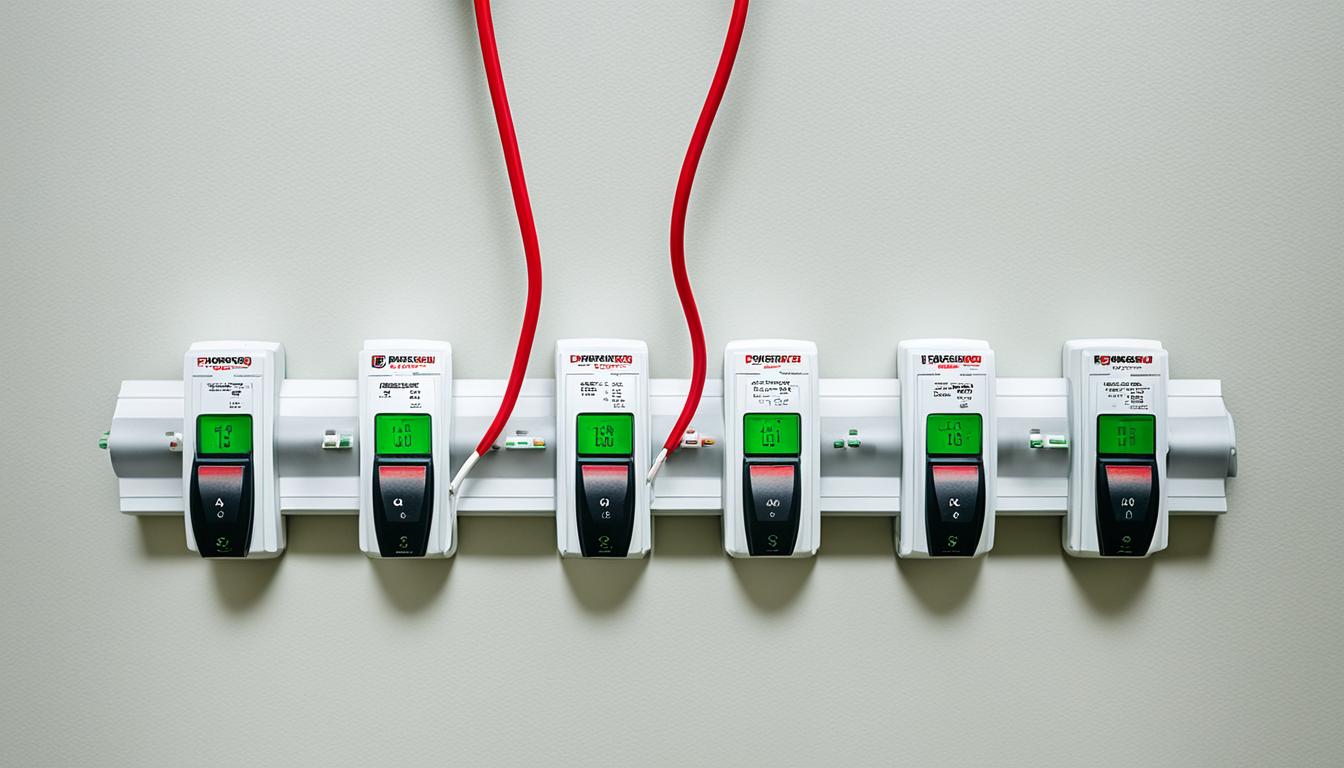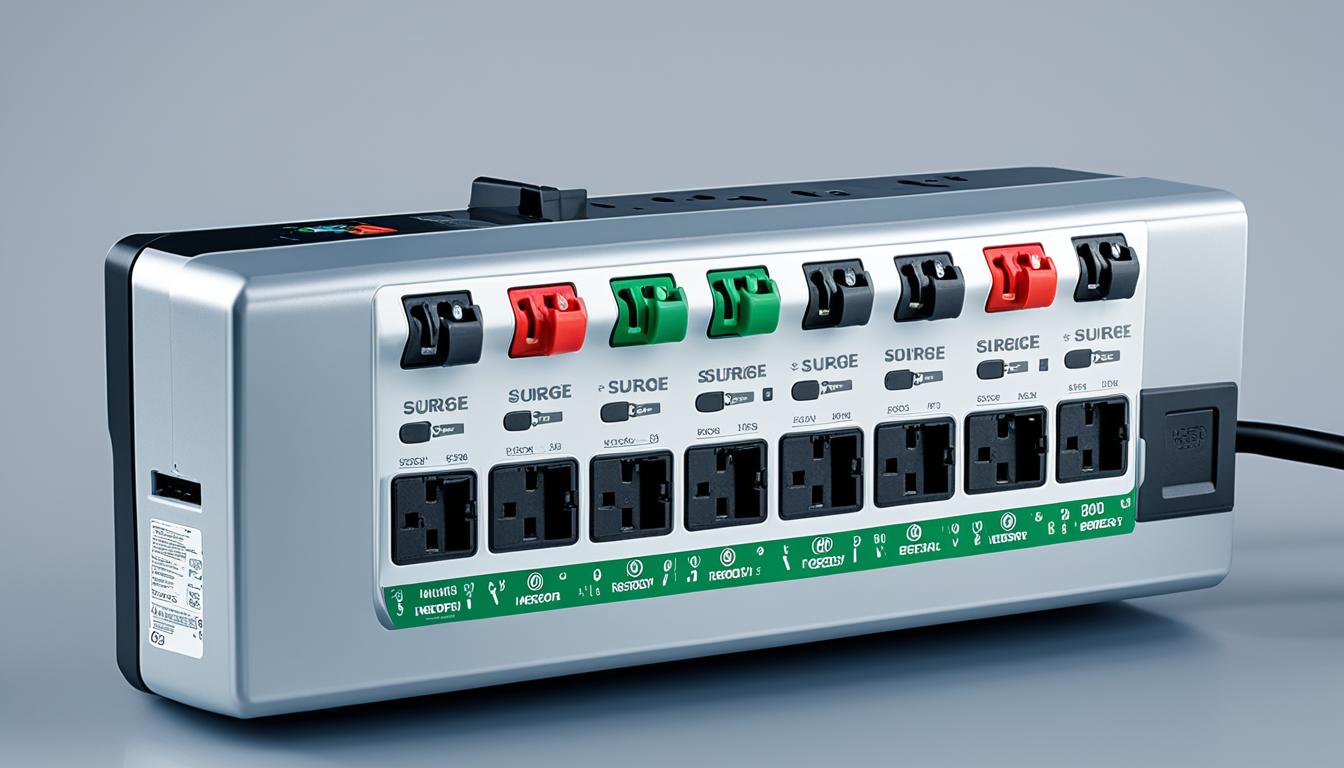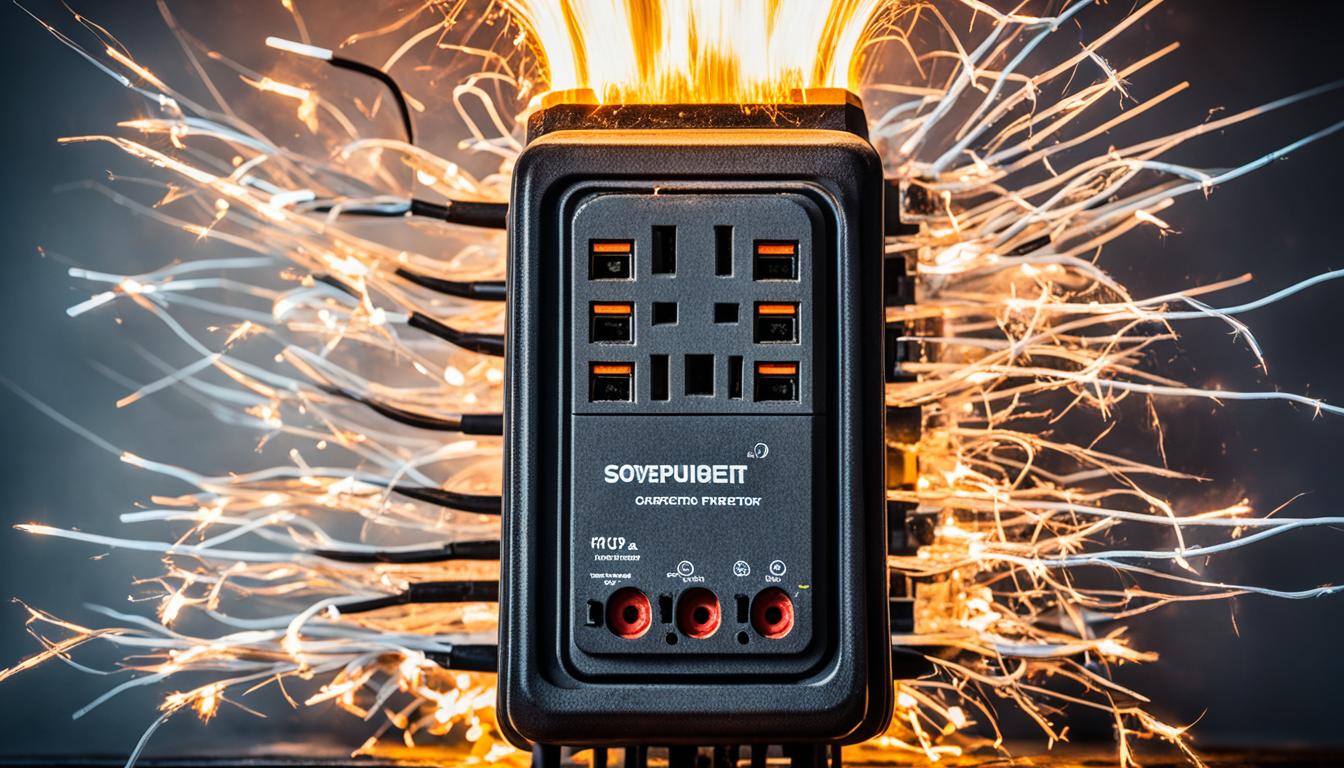extensioncords.site and its partners may earn a commission if you purchase a product through one of our links
Plugging a freezer into an extension cord is a common concern for individuals who need to set up their freezer in a location far from the nearest power outlet. While there are differing opinions on the safety of this practice, it’s important to understand the guidelines and precautions involved to ensure proper usage. Let’s delve into this topic to determine if it is safe and what factors to consider.
Key Takeaways:
- Plugging a freezer into an extension cord is possible but not recommended for long-term use.
- The National Electrical Code discourages permanent use of extension cords for high-power appliances like freezers.
- If temporary use of an extension cord is necessary, follow guidelines and take precautions for safe usage.
- Exploring safer alternatives such as installing a dedicated outlet or relocating the freezer is advisable.
- Consult reputable resources and consider guidance from a licensed electrician for further information and specific recommendations.
Is it Safe to Plug a Freezer into an Extension Cord?
The safety of using extension cords with freezers is a topic that sparks debate among experts. While some sources assert that it is safe, others discourage this practice due to potential risks and hazards. According to the National Electrical Code and the National Fire Protection Association, using an extension cord as a permanent solution for powering a freezer is not recommended.
The National Electrical Code and the National Fire Protection Association have outlined the potential risks associated with using extension cords for high-power appliances like freezers. This is because extension cords may not be designed to handle the continuous load required by freezers, which can result in overheating, electrical failures, and fire hazards.
However, temporary usage of extension cords with freezers can be done safely as long as certain guidelines and precautions are followed. It is crucial to choose an extension cord that is appropriate for high-power appliances and conforms to electrical codes. Ensure the wattage and amperage ratings of the extension cord match or exceed the requirements of your freezer.
Additionally, consider the length and gauge of the extension cord. Longer cords and lower gauge numbers (thicker cords) can accommodate higher power loads more effectively. Always inspect the extension cord for any signs of damage, such as frayed wires or exposed conductors, and replace it if necessary.
Remember, proper usage of extension cords with freezers should only be temporary. If you find yourself relying on extension cords for long periods, it is advisable to consult a licensed electrician to discuss safer alternatives, such as installing a dedicated outlet near the freezer.
Key Safety Points:
- Using an extension cord permanently for a freezer is not recommended by the National Electrical Code and the National Fire Protection Association.
- Extension cords may not be designed to handle the continuous load required by freezers, posing potential risks and hazards.
- If you need to use an extension cord temporarily, ensure it is appropriate for high-power appliances and conforms to electrical codes.
- Choose an extension cord with wattage and amperage ratings that match or exceed the requirements of your freezer.
- Inspect the extension cord for any damage and replace it if necessary.
- Consult a licensed electrician for safer alternatives, such as installing a dedicated outlet near your freezer.
Guidelines for Using Extension Cords with Freezers
If you find it necessary to use an extension cord with your freezer, it’s crucial to follow some guidelines to ensure safe usage:
- Choose the right extension cord: Select an extension cord that is heavy-duty and specifically designed for high-power appliances like freezers. Look for cords with a higher ampere rating to handle the load.
- Check the wattage: Determine the wattage of your freezer and make sure the extension cord is rated to handle the same or higher wattage. This information can usually be found on the freezer’s label or in the user manual.
- Inspect the cord: Before each use, carefully examine the extension cord for any signs of damage, such as frayed wires or cracked insulation. Do not use a damaged cord as it can pose a safety hazard.
- Proper placement: Position the extension cord in a way that prevents it from being pinched, crushed, or exposed to extreme temperatures. Avoid running the cord under carpets or rugs to prevent overheating.
- Avoid overloading: Never plug multiple appliances into the same extension cord as it can overload the circuit and increase the risk of fire. Use a separate extension cord dedicated to the freezer only.
- Keep it dry: Ensure that the extension cord remains dry at all times. Moisture can damage the cord and increase the risk of electrical shock.
- Unplug when not in use: When not actively using the freezer or when it’s not needed, unplug the extension cord from the power source to prevent any potential hazards.
By following these guidelines, you can ensure the safe usage of an extension cord with your freezer, minimizing the risks associated with improper usage.
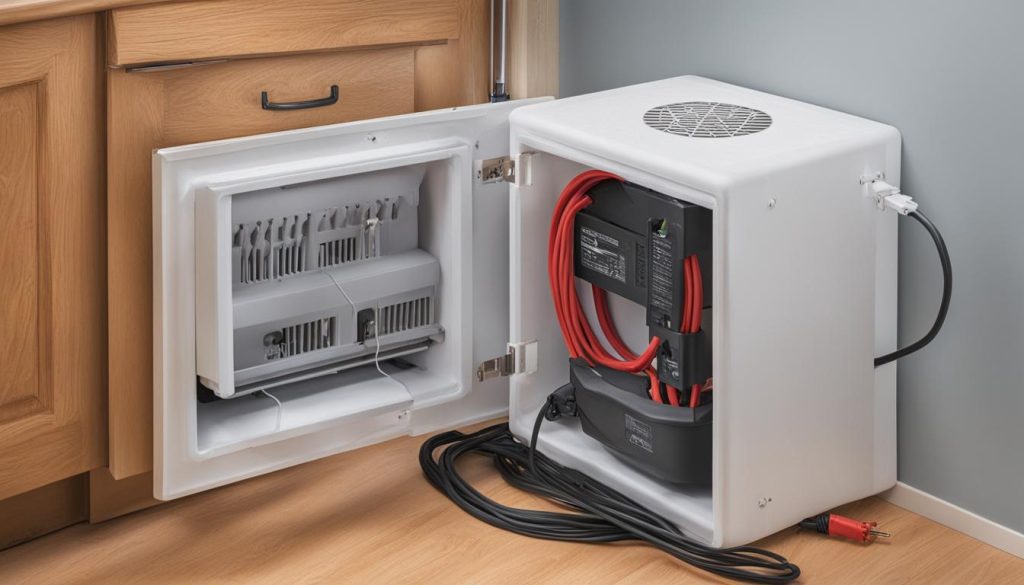
Safely Using an Extension Cord
When it comes to using an extension cord with your freezer, safety should be the top priority. Here are a few additional tips to keep in mind:
- Always use the shortest extension cord possible to minimize voltage drop and prevent overheating.
- Avoid daisy-chaining multiple extension cords together, as this can create an increased risk of overloading the circuit.
- Ensure that the extension cord is plugged into a grounded outlet to provide proper electrical protection.
- Regularly inspect the cord and connections for any signs of wear or damage, and replace them immediately if necessary.
- If you’re unsure about the appropriate extension cord to use or have any concerns about electrical safety, consult a licensed electrician for expert advice.
Following these best practices will help you safely use an extension cord with your freezer, ensuring the uninterrupted operation of your appliance without compromising your safety.
Precautions for Plugging a Freezer into an Extension Cord
While using an extension cord for your freezer may be a temporary solution, it’s crucial to take the necessary precautions to ensure the safety of your appliance and your home. Here are some essential precautions to keep in mind when plugging a freezer into an extension cord:
- Choose a heavy-duty extension cord: Opt for an extension cord specifically designed for high-power appliances, such as a freezer. Look for cords with a thick gauge wire, capable of handling the electrical load without overheating.
- Check the cord’s length: Ensure that the extension cord is long enough to reach the power outlet without stretching or being placed in a hazardous position. Avoid using multiple extension cords or daisy-chaining them together, as this increases the risk of overheating and electrical hazards.
- Inspect the cord for damages: Before plugging in your freezer, thoroughly examine the extension cord for any signs of wear and tear, frayed wires, or exposed insulation. If you notice any damage, replace the cord immediately to prevent electrical shocks or fires.
- Use proper electrical connections: Make sure that the extension cord is securely connected to both the freezer and the power outlet. Loose connections can cause arcing, leading to potential electrical hazards. Avoid overloading the extension cord by plugging in additional devices.
- Avoid placing the cord in high-traffic areas: Keep the extension cord away from foot traffic, doorways, or areas where it can be accidentally tripped over or damaged. Secure the cord to the floor or wall using cord clips or covers to prevent any accidents.
- Regularly monitor the cord and freezer: Periodically check the extension cord and freezer for any signs of overheating, unusual smells, or abnormal operation. If you notice any issues, immediately unplug the freezer, discontinue use of the extension cord, and consult a qualified electrician.
By following these precautions, you can minimize the potential risks associated with plugging a freezer into an extension cord and ensure the safe operation of your appliance. However, it’s important to remember that using an extension cord as a permanent electrical solution for your freezer is not recommended due to the potential hazards involved.
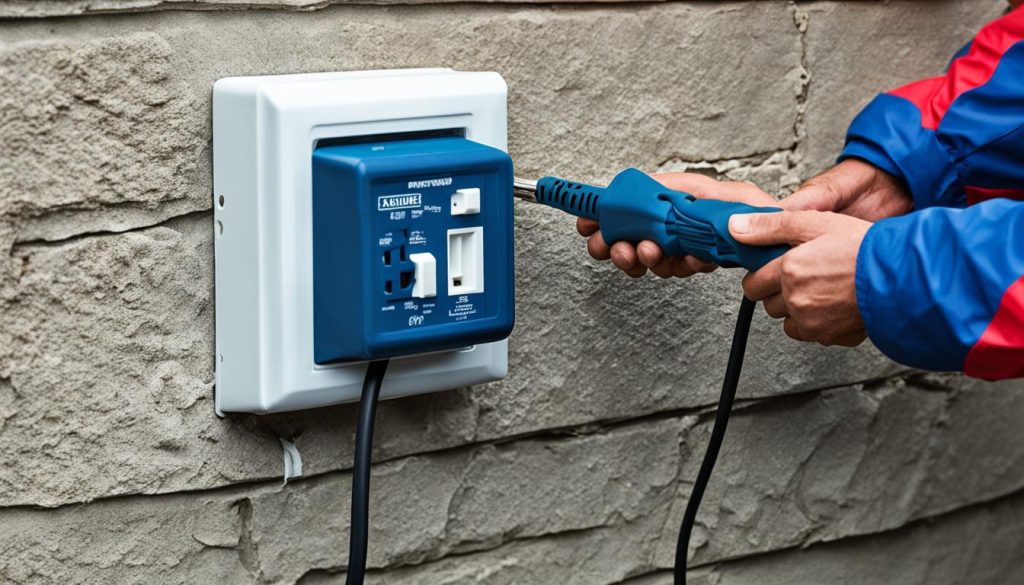
For more information on extension cord safety, consult reliable sources such as the National Electrical Code or contact a licensed electrician for personalized guidance and recommendations.
The Risks of Using an Extension Cord Permanently for a Freezer
While it may be tempting to use an extension cord as a permanent solution for powering your freezer, there are several risks and hazards associated with this practice. It’s important to understand these dangers and take necessary precautions to ensure the safety of both your electrical system and your household.
Overloading and Overheating
One of the primary risks of using an extension cord permanently for a freezer is the potential for overloading and overheating. Extension cords are typically designed for low-power devices and may not be able to handle the constant power demands of a freezer. This can lead to the cord overheating and potentially causing a fire.
Damaged Cords and Loose Connections
Another danger of long-term use of extension cords with freezers is the increased likelihood of damaged cords and loose connections. Over time, cords can become frayed or damaged, increasing the risk of electrical shorts or shocks. Additionally, frequent plugging and unplugging of the cord can loosen the connections, leading to electrical arcing and potential fire hazards.
| Risks of Using an Extension Cord Permanently for a Freezer | Dangers of Long-Term Use of Extension Cords with Freezers | Hazards of Using Extension Cords with Freezers |
|---|---|---|
| Overloading and overheating | Increased risk of damaged cords and loose connections | Potential for electrical shorts and shocks |
| Fire hazards | Reduced protection against electrical surges | Compromised electrical system integrity |
| Electrical shorts and shocks | Limited flexibility and maneuverability | Higher likelihood of accidents |
In summary, using an extension cord permanently for a freezer poses significant risks to both your electrical system and the safety of your home. It is best to avoid this practice and instead consider safer alternatives such as installing a dedicated outlet specifically designed for high-power appliances like freezers. By following these guidelines, you can protect your household from potential hazards and ensure the longevity of your freezer.
Safer Alternatives to Using an Extension Cord for a Freezer
While using an extension cord to power your freezer may seem like a convenient solution, there are safer alternatives that you should consider. These alternatives provide more reliable and stable power sources for your freezer, ensuring the safety of both your appliance and your home.
Installing a Dedicated Outlet for Your Freezer
One of the best alternatives to using an extension cord is installing a dedicated outlet for your freezer. This involves hiring a licensed electrician to add a new outlet specifically designed to support the power requirements of your freezer. By directly connecting the freezer to a dedicated outlet, you eliminate the need for an extension cord and reduce the risk of electrical hazards.
Having a dedicated outlet provides a stable and secure power source for your freezer, ensuring that it receives a consistent electrical supply without overloading the circuit. This can help prevent potential damage to your freezer and reduce the risk of electrical accidents or fires.
Relocating Your Freezer to a Suitable Location
If installing a dedicated outlet is not feasible or necessary, another option is to relocate your freezer to a location closer to an existing power outlet. This eliminates the need for an extension cord altogether and ensures that your freezer is safely connected to a proper power source.
When choosing a new location for your freezer, ensure that it is in an area that is easily accessible for regular maintenance and cleaning. Additionally, make sure that the power outlet you plan to use is grounded and meets the necessary electrical requirements for your freezer.
Purchasing a Freezer with a Longer Power Cord
If you haven’t purchased a freezer yet or are planning to upgrade, you can consider choosing a model that comes with a longer power cord. Freezers with longer power cords provide greater flexibility in terms of placement and reduce the need for an extension cord.
Before making a purchase, measure the distance between your desired freezer location and the nearest power outlet to ensure that the power cord is long enough to reach without the use of an extension cord. This way, you can avoid the potential hazards associated with using an extension cord for your freezer.
| Alternative | Pros | Cons |
|---|---|---|
| Installing a Dedicated Outlet | – Provides a stable power source – Reduces risk of electrical hazards – Prevents damage to the freezer |
– Requires hiring a licensed electrician – Involves additional cost |
| Relocating Freezer to a Suitable Location | – Eliminates the need for an extension cord – Ensures safe connection to a power source |
– May require rearranging the space – Limited by availability of power outlets |
| Purchasing a Freezer with a Longer Power Cord | – Provides flexibility in placement – Reduces reliance on an extension cord |
– Limited options in the market – May incur additional cost |
Remember, the safety and proper functioning of your freezer rely on a stable and suitable power supply. By opting for a dedicated outlet, relocating your freezer, or choosing a model with a longer power cord, you can avoid the potential hazards associated with using an extension cord. Prioritize the safety and longevity of your freezer by exploring these safer alternatives.
Conclusion: Understanding the Safety and Limitations of Using Extension Cords with Freezers
After exploring the topic of using extension cords with freezers, it becomes evident that while it is possible to plug a freezer into an extension cord, it is not the recommended or safest option for long-term use. The National Electrical Code and the National Fire Protection Association discourage the permanent use of extension cords for high-power appliances like freezers due to the potential risks and hazards involved.
If you find yourself needing to use an extension cord temporarily, it is essential to follow guidelines and take precautions to ensure safety. However, it is advisable to weigh the risks and consider safer alternatives such as installing a dedicated outlet or relocating the freezer to a more suitable location.
By consulting a licensed electrician, you can gain valuable guidance in choosing the best solution for your specific situation. It is crucial to prioritize the safety of your home and the longevity of your appliances when it comes to electrical connections.
Remember, the safe use of extension cords with freezers is a matter of understanding their limitations and making informed choices. By taking the necessary precautions and seeking professional advice, you can ensure the optimal operation of your freezer while minimizing the potential risks associated with using extension cords.
Ensure the longevity of your appliances and the safety of your home by making informed decisions when it comes to electrical connections. Prioritize the safety of your home and the well-being of your family, and consult a licensed electrician for expert guidance.
Resources for Further Information on Extension Cord Usage with Freezers
For more detailed information and resources on extension cord usage with freezers and electrical safety, there are several reliable sources you can consult:
1. The National Electrical Code (NEC) – The NEC provides guidelines and standards for electrical installations, including information on extension cord usage. You can access the latest version of the NEC from the National Fire Protection Association’s (NFPA) website.
2. Electrical Safety Foundation International (ESFI) – The ESFI offers valuable resources and educational material on electrical safety. They provide information on safe practices, including using extension cords with appliances like freezers.
3. Consumer Product Safety Commission (CPSC) – The CPSC is a government agency that focuses on consumer product safety. Their website features safety tips and guidelines, including information on electrical safety and the proper use of extension cords.
Remember, it’s important to rely on reliable and authoritative sources when seeking information about extension cord usage and electrical safety. These resources can provide the most up-to-date guidelines and best practices for using extension cords with freezers.
FAQ
Can I plug a freezer into an extension cord?
While it is possible, it is not recommended, especially for long-term use. Using an extension cord permanently for a freezer is not recommended due to potential risks and hazards.
Is it safe to plug a freezer into an extension cord?
The safety of plugging a freezer into an extension cord is a subject of debate. The National Electrical Code and the National Fire Protection Association discourage permanent use of extension cords for high-power appliances like freezers.
What are the guidelines for using extension cords with freezers?
If you need to use an extension cord temporarily with your freezer, follow these guidelines: choose a heavy-duty, grounded cord with a sufficient amperage rating, avoid using multiple extension cords, ensure the cord is not damaged or frayed, and do not exceed the cord’s maximum load capacity.
What precautions should I take when plugging a freezer into an extension cord?
To minimize risks and ensure safety, take these precautions: ensure the cord is not overloaded, avoid running the cord under rugs or carpets, keep the cord away from water sources, and do not pinch or damage the cord.
What are the risks of using an extension cord permanently for a freezer?
Some of the main risks include overheating, electrical fires, damage to the cord or plug, and reduced efficiency of the freezer.
What are the safer alternatives to using an extension cord for a freezer?
Instead of relying on an extension cord, consider installing a dedicated outlet for the freezer or relocating the freezer to a more suitable location with a nearby power outlet.
Can I use any extension cord to plug in my freezer?
It is essential to choose a heavy-duty, grounded extension cord with an appropriate amperage rating for your freezer. Refer to the manufacturer’s guidelines and consult a licensed electrician if needed.
How can I ensure the safe use of an extension cord with my freezer?
Follow the manufacturer’s instructions for your freezer, regularly inspect the extension cord for any damage or wear, and be mindful of overloading the cord with other appliances.
Where can I find more information about extension cord usage with freezers and electrical safety?
For more detailed information and resources on extension cord usage with freezers and electrical safety, consider consulting reliable sources such as the National Electrical Code, the National Fire Protection Association, or consulting a licensed electrician.
